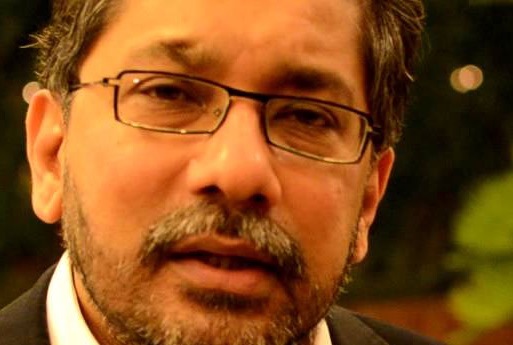A Brief Colonial History Of Ceylon(SriLanka)
Sri Lanka: One Island Two Nations
A Brief Colonial History Of Ceylon(SriLanka)
Sri Lanka: One Island Two Nations
(Full Story)
Search This Blog
Back to 500BC.
==========================
Thiranjala Weerasinghe sj.- One Island Two Nations
?????????????????????????????????????????????????Tuesday, June 27, 2017
Saman Kelegama (1959-2017): A Thinker Of A Think Tank
 The totally unexpected and devastating news of the untimely demise of Dr. Saman Kelegama on Friday 23rd June
has left many people shocked and sad. I have not seen such an
outpouring of messages of condolences from a wide spectrum of people on
the death of an Economist. Indeed, Saman was a very gentle and amiable
person who earned respect and admiration as a humble and modest human
being. While saddened by the realisation of the fact that he is no more,
as my professional paths crossed very frequently with Saman’s, I would
like to reflect on what made Saman so well-recognised and respected as
an Economist in the Sri Lankan context. While I join many people who
grieve Saman’s passing, this note is not an obituary but an attempt to
understand Saman’s role as a leader of a Think Tank.
The totally unexpected and devastating news of the untimely demise of Dr. Saman Kelegama on Friday 23rd June
has left many people shocked and sad. I have not seen such an
outpouring of messages of condolences from a wide spectrum of people on
the death of an Economist. Indeed, Saman was a very gentle and amiable
person who earned respect and admiration as a humble and modest human
being. While saddened by the realisation of the fact that he is no more,
as my professional paths crossed very frequently with Saman’s, I would
like to reflect on what made Saman so well-recognised and respected as
an Economist in the Sri Lankan context. While I join many people who
grieve Saman’s passing, this note is not an obituary but an attempt to
understand Saman’s role as a leader of a Think Tank.
Kelegama
emerged as an Economist upon receiving an illustrious training at
Oxford. His father, Deshamanya Dr. J. B. Kelegama, was an eminent
scholar and civil servant who was much respected in Sri Lanka. As such,
Kelegama had all the credentials and the pedigree to embark on his
career as an Economist. However, he did not choose a conventional
academic career, like his father nor did he join the Central Bank or the
public service to pursue a career at a place like the Treasury.
Instead, Kelegama chose to work for the Institute of Policy Studies
(IPS) which was called a Think Tank at a time when only a few people
knew the purpose and function of a Think Tank. Kelegama’s name is
intrinsically enmeshed with the IPS, the Colombo-based Think Tank, which
he gave leadership to since 1995 until his untimely demise.
I
think it was Kelegama who made Think Tanks an operative term in the Sri
Lankan context. In fact, it was not Kelegama who founded IPS. However,
Kelegama was undoubtedly the singular person who made IPS so
well-recognised in Sri Lanka, as a premier Think Tank that offers
research and policy advice on economic affairs and related subjects. The
emergence of IPS marks a salient milestone in Sri Lankan contemporary
history as a direct corollary to the water-shed transformation in Sri
Lanka when an aggressive economic policy shift liberalised the economy
in 1977. I am privy to an anecdote shared by Dr. Howard Nicholas, an
eminent Economist of Sri Lankan origin, now domiciled in The
Netherlands, about the conception of IPS. As I recall, the then Finance
Minister Ronnie de Mel has stressed the importance of having an
independent Think Tank to generate ideas and
offer policy advice to the new environment of the economy, business and
trade under what was popularly called an ‘open economy’. Howard has
been entrusted with the task of doing the spade work of this novel
venture which took the name of IPS in 1988. Howard himself led IPS in
the years of its infancy albeit maintaining a low-key.



